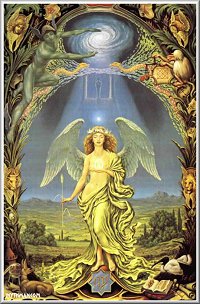VIRGO - The Virgin
July 23- August 22
SYMBOL - The Virgin
ELEMENT - Earth
QUALITY - Mutable
RULING HOUSE - Sixth
PLANET - Mercury
QUALITIES
Analytical
Modest
Responsible
Hardworking
Sensitive
Smart
Meticulous
Magnetic
LUCKY COLOUR - Blue
LUCKY STONE - Sapphire
LUCKY DAY - Wednesday
LUCKY NUMBER - Five

Virgo
by BATKAYA
CLICK TO ENLARGE

Virgo
CLICK TO
ENLARGE

Virgo
by
JOSEPHINE WALL
CLICK TO ENLARGE

Virgo
by KHOITIBET
CLICK TO ENLARGE
Virgo is ruled by Mercury, and
as portrayed in ancient Roman mythology, Mercury wasn't
one to sit still for long. This swift-footed god was a
bundle of energy, both physically and mentally, and that
pretty much sums up the Virgin's makeup.
A Virgo's brain is in overdrive most of the time, which
is why these folks get so much done. Those born under
this sign are also able communicators and use their
mental acuity to maximum advantage.
All of this brainpower can make Virgos prone to
skepticism, and can even lead to the kind of over-think
that surely leads to overkill. Thankfully, though,
Virgos are also a studious lot and can temper their
worst impulses with a bit of careful analysis.
Virgos enjoy studying a situation in great detail,
whether it's a work project or a friendship. Virgins are
truly interested in understanding things.
(c) astrology.com |
|

VIRGO PART TWO - PLEASE READ PART ONE
FIRST OR BE PUZZLED

Demeter was devastated with the news of her beloved daughter's
abduction. She wondered what cretin could be so brazen as to kidnap her
girl in broad daylight, while in the company of such lofty
chaperones.
Zeus wasn't about to tell. No sir! He feared Demeter's wrath were she to
find out his accomplice role in the affair, and besides, he was
real busy chasing after sexy maidens, willing or otherwise.
'So little time, so many nymphs', was Zeus' motto.
As any grieving mother would do, Demeter set out to look for her
Persephone. Armed with lit torches, doggedly she traveled all over
the world to find her.
Memo to Demeter: You're not about to locate her on earth. Think
lower.
But the mother's disconsolate anguish produced unforeseen
results. As Demeter peripatetically wandered throughout the land
looking for her missing child, she deliberately neglected her
divine duties.
The revered goddess of the Harvest forbade the earth to produce
and, consumed by her sorrow, she caused all vegetation to stop
growing.
Within a short period, everything began to wither and die. Winter
for the first time fell upon
the land -- the Bohemian era of perpetual springtime had
ever so tragically ended. Paradise lost, alas.
Still Demeter scoured the earth, indifferent to the earth's
plight, looking high and low for
Persephone, but not looking low enough.
Meanwhile, down in the Underworld, things were tumultuous to say
the least. Having attained the sweet object of his desire, Hades
now had to convince her to become his wife. Tough sell indeed.
It's not that Hades wasn't attractive, in a creepy kind of way;
it's just that, well, Persephone really wanted to honor her
mother and remain unatached. Besides, this nasty old god had quite
violently stolen her from Demeter, rather than going through the
proper matchmaking channels. How rude.
But the Lord of Darkness, whose name mere mortals dared not
utter lest he heard them and came for their souls, sure did have
a lot to offer, including:
 Dominion over countless souls; hey, free domestic help up on
earth was damn near impossible to find! This could work, she
reflected; I'd
never have to lift a finger.
Dominion over countless souls; hey, free domestic help up on
earth was damn near impossible to find! This could work, she
reflected; I'd
never have to lift a finger.
 Possession of all the world's gold, gems and
jewels, since they were found beneath the ground; that's why he
was called Pluto, literally, 'rich'.
Possession of all the world's gold, gems and
jewels, since they were found beneath the ground; that's why he
was called Pluto, literally, 'rich'.
 Not to mention
his real hot Gothic-style palace, equaled only by the very abode
of the gods, way up on lofty Mount Olympus; Not to mention
his real hot Gothic-style palace, equaled only by the very abode
of the gods, way up on lofty Mount Olympus;
 Complete with a couple of
matching, uber-regal His and Hers black marble
thrones, exquisitely bejeweled with every kind of gem and
diamond imaginable, compliments of creative Hephaestus. Complete with a couple of
matching, uber-regal His and Hers black marble
thrones, exquisitely bejeweled with every kind of gem and
diamond imaginable, compliments of creative Hephaestus.
'Sweet', mused Persephone...'especially that
'gold and jewel' bit. The other girls will be so
envious!'
"Did you say you own ALL of the gold, diamonds, rubies,
emeralds and sapphires in existence? Can I see?"
"Sure, right this way, sweetie. I keep the whole lot in my
bedroom, strictly for security's sake of course. Watch you don't stumble into that
endless mountain of diamonds, they can cut."

What's a teenaged girl to do? Persephone desperately wanted to rejoin
Demeter and the friends that she missed so much, but daily she
found herself growing fonder of her abductor. And what a
fine chariot he drove!
Secure at his side, she loved whizzing around the vast and
cavernous Underworld, all the Shades bowing down in solemn
reverence, and even the infernal River Styx momentarily stilling
Her sacred waters in silent paean to their passage.
Back 'Upstairs', as Hades liked to refer to earth, things finally reached a crisis point. The
world had turned cold
and barren, and the famished people and animals were perishing
in unprecedented numbers. The entire planet's survival was at
risk!
Helios, the all-seeing Sun god, was the only one who had
witnessed the abduction of Persephone and had recognized the
culprit. Taking pity on the mother's heartbreak and torment,
at last he
told Demeter what he had seen.
Was she ever ticked! Not only did Demeter never consider looking
for her daughter in the Underworld, but now she discovers that
her own brother, Hades, was the miscreant! For shame!
But what could she do? Hades was all-powerful in his
dark subterranean domain and there was no way to invade or gain entry
into it without his express approval. What could she do?
Demeter decided to take her plight to the highest arbiter, Zeus.
On bent knee she beseeched the King of the Olympians to convince their
brother Hades to release Persephone.
Zeus was torn, but faced with Demeter's misery and sorrow, and
in view of the starving world, he reluctantly decided to render
a verdict:
Hades must return Persephone to her mother at once!
Hades had no choice but to agree, but the dark Lord of the
Underworld was cunning. He informed Persephone that she was being
immediately released, and gave her seven pomegranate seeds to eat.
Now Persephone, in her spite at being abducted, had not tasted any food or water ever since her
kidnapping, and understandably she was starving. Knowing that
she was about to rejoin her mother, eagerly she
accepted the proffered fruit and proceeded to devour the seven
seeds.
Hades had tricked her, by giving her the pomegranate seeds to
eat! Having
taken food while still in the Underworld, under divine law Persephone was
obligated to remain there.
That would not do by Zeus! He had spoken, and his word was not
to be trifled with! Still, divine rules
are divine rules; protocol must be observed.
The Thunder Bringer pronounced that Persephone, having
eaten of the forbidden fruit in Hades, must spend a third of each year there, or half of each
year as others in the northern climates claim.
Reluctantly Demeter agreed to this, champing at the bit to
re-unite with her daughter, praying that Hades wasn't too rough on the
innocent maiden.
The wedding of Hades and Persephone was a grandiose event
befitting such noble Olympian deities. She was given the city of Thebes
by Zeus in acknowledgement for a favor she had bestowed
upon him
and in like manner Sicily was said to have been given to her at
her wedding.
Two festivals were celebrated in her honor in the island each
year, the one at the time of sowing, and the other at harvest
time.
Hades gave her jewelry. Lots and lots of jewelry.
She was commonly worshipped -- along with Demeter, and with the
same cryptic mysteries -- in places such as Boeotia, Corinth, Megara,
Sparta, and at Locri in the south of Italy. Temples to
Persephone are mentioned at all those locales, and many more.
The story of Persephone spending one part of the year in the
Lower World, and another with the gods 'Upstairs', made her the
enduring symbol of new vegetation which shoots
forth in spring, and the essence of which withdraws into the
earth at other seasons of the year, only to return yet anew.
The ancient writer Plutarch identifies her with spring, and
Cicero calls her 'the seed of the fruits of the field'. In the
divine and highly secret mysteries of Eleusis, the return
of Cora or Kore -- 'daughter', another name for Persephone --
from the Lower World was regarded as the symbol of immortality
and hence she was frequently represented on sarcophagi.
In the mystical theories of the Orphics, and what are called the
Platonists, Cora is described as the all-pervading goddess of
nature, the producer and destroyer of all things. She is
therefore mentioned along, or identified with, other mystic
divinities, such as Isis, Rhea, Gaea, Hestia, Pandora, Artemis
and Hecate.
Upon Persephone's return, spring immediately arrived and the earth flourished
with vegetation and color. The world was saved!
Persephone's image was placed by Zeus on the sky as the
constellation Virgo, to
honor her return to Demeter, and the survival of the earth. And
the overjoyed people partied hard.
And then Dionysus and his wild posse arrived -- the noble grape
having been harvested -- and the overjoyed people partied
harder.
That's how Virgo the Virgin became part of the honored and
exalted Little Animals in a Circle!
|







